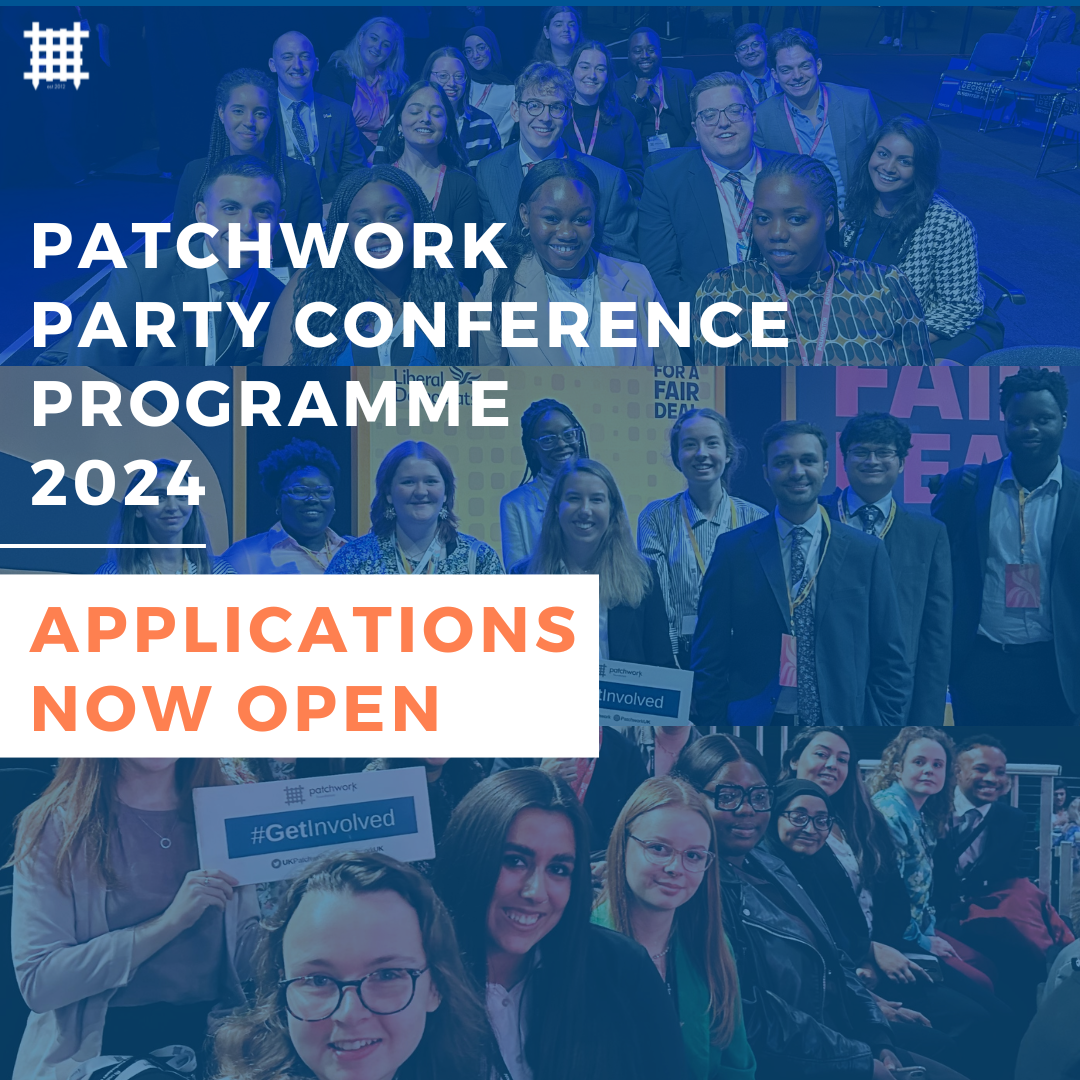”I remember how lively and engaging it was and how passionate a room full of young people were so bought into the idea of democracy changing their own and other lives for the better. Thank you, Patchwork Foundation for all the work you do, it is an honour for me to support you.”
Pam is a Strategy Manager within the Department for Education’s Recovery Strategy Unit, having previously led strategy advisory at the British Council. Her professional experience spans Consulting, Governance and Finance, having trained through PwC’s Graduate Scheme.
Pam is passionate about supporting disadvantaged young people. From the age of 16, she led an award-winning social mobility organisation (Voice 21 Magazine) and, is on the board of Brightside, a leading social mobility charity in the UK. In 2021, Pam was named one of McKinsey’s Next Generation Women Leaders, finalist at the Women in Accountancy Awards 2020, and named a ‘Founder of the Future’ by Founders Factory.
What are you up to at the moment?
My time lately has been spent getting to grips with education recovery challenges. A big part of my role so far has involved embedding strategic methodologies and rigour into the unit. I set-up our horizon-scanning function, which will enable us to look ahead to the future, digest the next big trends, datasets and reflect on the likely future of education after two years of a pandemic. So that’s where my public sector consulting experience from PwC has been really helpful, particularly on having a broader sense of what is good practice across Government. I’ve found bringing methodology and specialist expertise to the Civil Service has been really welcomed, and people in my team have given me such great feedback about how it’s a great learning opportunity for them, especially experiencing how we can leverage these kinds of methodologies across the private and public sector.
You’ve done a lot in education throughout your career – why education? What is it that drew you to that area?
I fell into it by chance as part of my professional career. I was passionate about equal opportunities when I was younger because I was given a lot of support by small social mobility charities in terms of developing my soft skills, leadership and aspiration. I’m so grateful for what this did for me, that I’ve always wanted to ensure other disadvantaged young people had the same opportunities. I was selected to lead an established social mobility charity when I was 16 and most recently joined the board of Brightside, one of the UK’s leading social mobility charities.
After joining PwC’s graduate scheme, I was enjoying doing a mixture of projects across the public and private sector. I worked with a really great leader who took me under his wing, and he happened to work on a lot of education projects. I found working with someone really inspiring, who was passionate about the sector, and who also empowered me to really think about these problems in a lot of depth, just really sparked my passion for it in adulthood in terms of my professional work. I didn’t even think this could be a career – that I could focus on education strategy, finance and governance professionally.
Why did you move from the private to the public sector, and what have been some of the biggest differences?
PwC really did allow me to build a lot of credibility in my early career, and that was one of the reasons I joined. From day 1, you have direct exposure to numerous complex strategic challenges facing big organisations and leading meetings with senior industry figures. Ultimately, I left because I felt like it was a good time to leave to try something different, before I became too committed to that career path. I haven’t always set out to work in the public sector – I just reached a point where I wanted to learn more about the sector by being in it.
One thing I really took from my time in Consulting, was the value in building up expertise within a professional specialism, whilst gaining exposure to different sectors. My day-to-day draws upon a lot of judgement and challenges I’ve seen elsewhere in similarly complex environments, as well as the financial literacy that comes with traditional Accountancy training.
What’s the most challenging part about working in the sector at the minute?
When I joined the British Council, we were reacting to the pandemic. A lot of major projects (e.g. moving completely to remote education) were being stood-up and run at pace as we were trying to react to developments. A year into the pandemic you notice the pandemic’s not going away any time soon. We’d set up projects thinking it was going to be a six week thing, so we had to think about what we were going to do now that it was going to be another year. Similar things have been happening throughout the public sector, and that’s been a massive challenge. A lot of projects get stood up at pace and then they have an existential crisis, and that’s a type of problem I don’t think a lot of organisations had seen before.
For education more specifically, a fundamental challenge is that the pandemic hit the sector, and there is no precedent. This results in a need to respond to issues with imperfect information and identifying big data gaps.
You’re passionate about social mobility and are on the board for Brightside. Tell us more about that.
Brightside is a social mobility charity that was founded in 2004 and they work to provide high-quality mentorship to young people from disadvantaged backgrounds. It’s been one of the best roles I’ve ever had. It’s amazing to be part of an organisation where you’re working with really inspiring leaders.
I sit on the Finance and Risk Committee and the Technology Committee, which allows me to exercise knowledge from both my Consulting and Public Sector careers, whilst testing ideas against my lived experience. The board-route also gives you a lot of leadership exposure. It’s been such a good board for me to join at this stage in my career, because they gave us so much initial support to get us to the right standard. The feedback we get from other board members is also really valuable. It’s been an accelerated development experience and I highly recommend it to others interested in leadership and governance.
What do you think is the power of mentoring in social mobility?
I think it’s really powerful to connect two people who would never ordinarily meet, especially if one of them is from a disadvantaged background. And it’s a great equalizer – I think the best mentors are the ones who make their mentees feel like it’s a privilege for them (the mentors) to speak to the mentees, as much as it is the other way around. That’s one thing I’ve always advocated for in mentor-mentee relationships. There’s nothing worse than feeling like you’re talking to some kind of A-list celebrity who are very precious about their time. There’s a lot that mentors get out of speaking to people outside of their immediate experience, and I think that’s really powerful.
I think it also helps young people understand the fast-changing career landscape a bit better. I think it gives them a low stakes opportunity to learn about different careers without having to worry about navigating unpaid/low paid internships in central London.
What do you think is ‘next for you’?
Broadly speaking, I know I get a lot of energy working in the strategy/governance space, so I really want to continue building up my specialist expertise and sector knowledge. I’ve really enjoyed my time so far at leading organisations in the Education space (British Council, Brightside and DfE), working with so many inspirational colleagues and leading multidisciplinary teams to drive forward profound change.
There’s not many people in traditionally privileged sectors who come from a disadvantaged background, and the statistics sadly still show that. I always try to be the leader I’ve never had, because there just aren’t many people from that background proactively role modelling and supporting others.
What do you think still needs to be done to make social mobility easier/more possible?
To tangibly improve workplace diversity and culture, you need leadership who come from all walks of life, have first-hand experience of diversity and drive authentic leadership. I think that’s important for the on-the-ground change that most organisations remain in need of.
Do you have any tips or tricks for networking?
My approach to networking is to go hard or go home! I love talking to people and learning about the unique experiences and paths they’ve taken. When I reach out I make it clear why I want to speak to someone and really try to spark up a personal relationship. Nine times out of ten, when I’ve written to someone, they will respond. I think the biggest barrier in reaching out to someone, is the fear of not getting a response. In my experience the more you personalise your approach, and make it clear why you want to speak to them (having done your research) you will get a response, and likely a valuable one too.
What piece of advice would you give to a young person just starting out in their career?
I always encourage getting exposure to as many different fields as possible early on. The decisions you make when you’re 16 or 18 don’t need to be the ones you’re stuck with, and your early career is a great time to try lots of things with low stakes and learn more about what you like doing. It’s a cliche, but if you enjoy something, you’re naturally going to do well at it and progress. For those specifically interested in Civil Service Careers, there are of course a variety of routes to explore such as Summer Diversity Internships, Fast Stream and Apprenticeships.
In the last 10 years there’s been a lot of rapidly growing disciplines that are great spaces to get involved in – I’m thinking about things ranging from Major Programme Management to EdTech. Rapidly evolving disciplines are a great equalizer where young people can come in and make their mark.
I always recommend seeking out the leaders in your organisation with who you resonate with the most. Seek out that mentorship aspect early on. When you find leaders who really resonate with your journey, they can sponsor and champion you which is really powerful.
Why did you join Patchwork, and what did you get from the experience?
I joined Patchwork because a friend of mine did it and mentioned that it was such a good organisation for breaking down barriers in what is a traditionally privileged sector. I was just so thrilled to be part of the network, because it was hugely supportive with lots of inspirational young people in the same career phase.
Getting the opportunity to have intimate mentoring sessions with some very senior figures across government was an experience that none of us would have otherwise. I think after graduation it gave a lot of us gravitas in terms of talking to senior leadership and managing upwards. I saw that for so many people who went through that cohort with me, their confidence just grew rapidly in terms of talking to leadership and how they handled themselves.
Ultimately, I also believe it’s a privilege for these leaders to talk to us, as much as it is vice-versa. I think a lot of Patchworkers went on that journey through the sessions where they were talking to Mark Sedwill or Sarah Healey, realising that we have so much value-add to provide within discussions too.
We’ve just had our 2022 Masterclass Induction. Do you have any advice for new Patchworkers?
My advice would be to go into every session open-minded, to take notes so that you can reflect on them afterwards, and after you’ve gone through the Programme to reflect on which of the leaders resonated with you the most and why. Think about how you can apply that style to your day to day, because no matter what role you’re doing you’ll likely have an element of leading downwards, across, or upwards, so you can take from these sessions in that respect.
I’d also encourage them to stay in touch with each other and where possible, the senior leaders encountered, because it’s a great opportunity to build your network in the sector. I’ve found the legacy it left in my life in terms of finding new senior mentorship has been powerful.
Stay updated
Join our mailing list to stay up to date with all the latest!
Latest news
Testimonials



